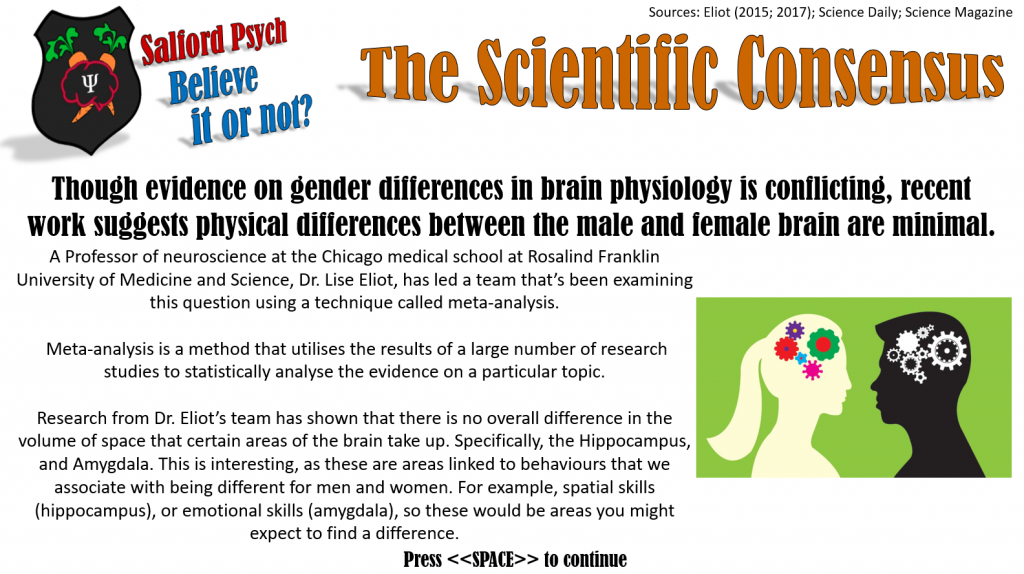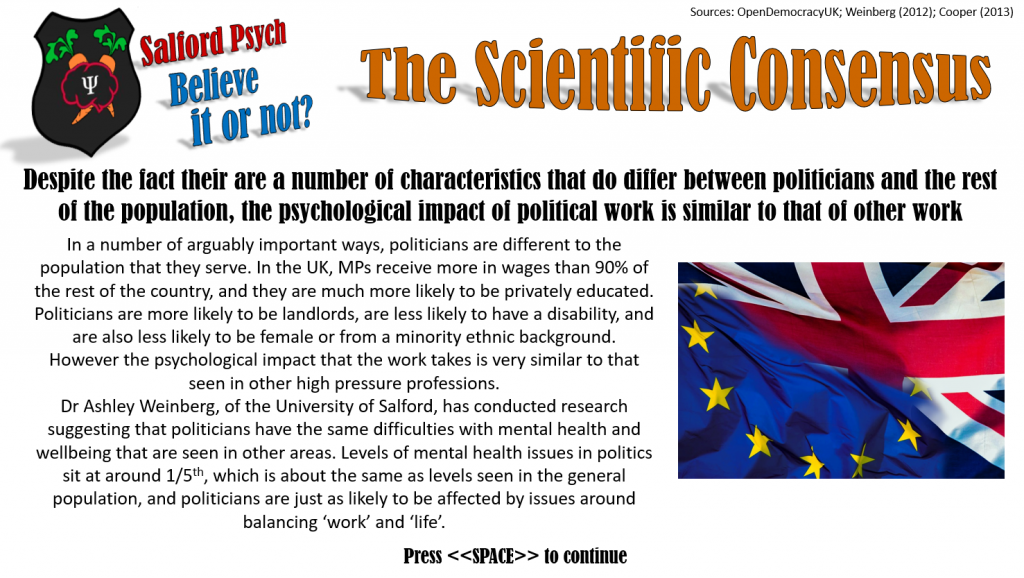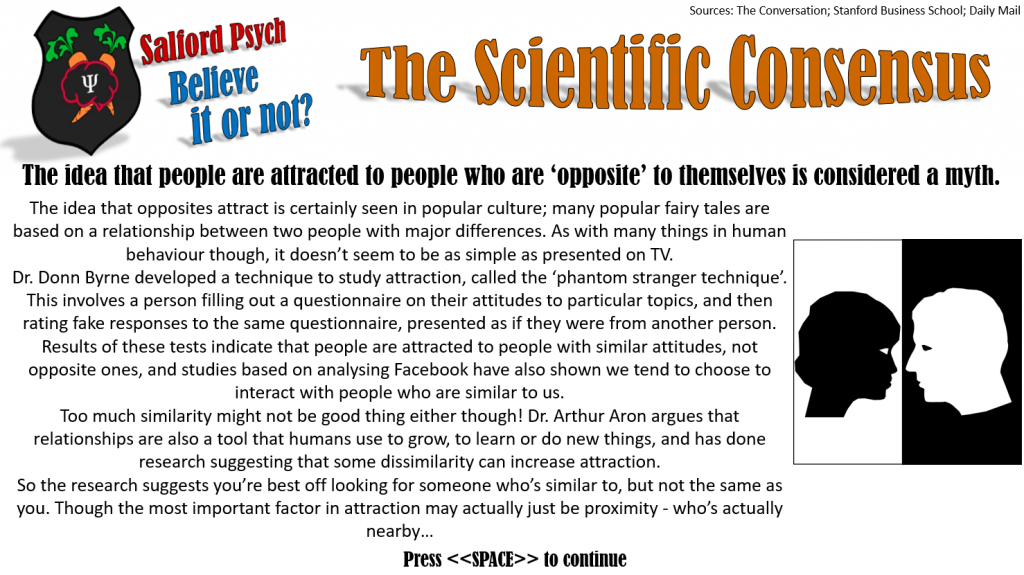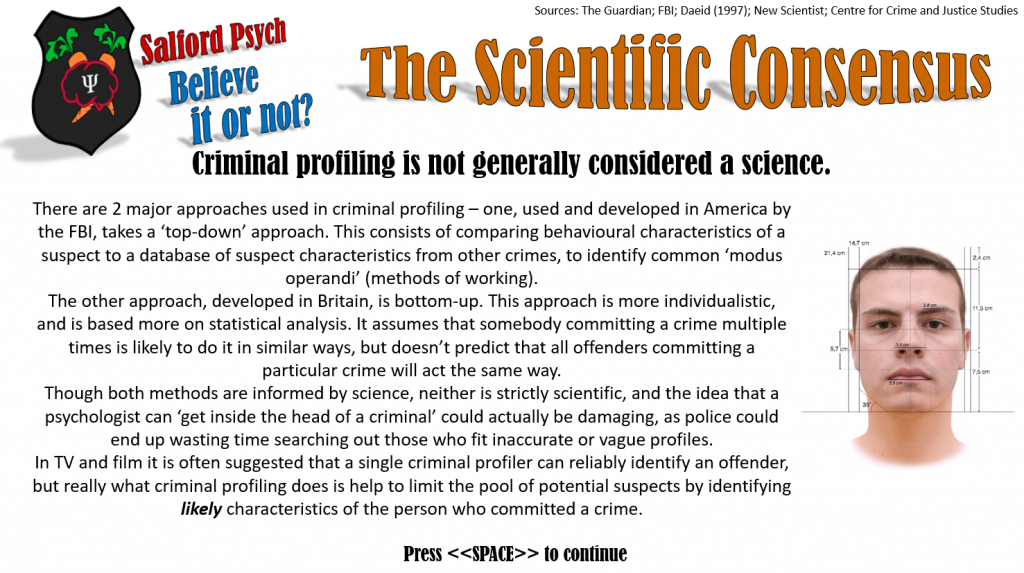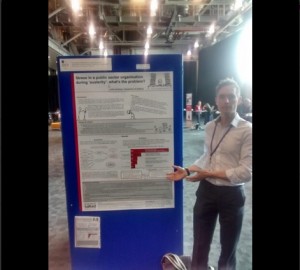At the Manchester Science Festival this year, we joined the #CitizenScience Showcase and Library of Fake news at MediaCityUK, to run a mock ‘Believe it or not?’ psychology investigation, to show how data might be collected to address the question ‘why do people believe the ideas that they come across in daily life?’.
We’re also interested in how beneficial science festivals are, and particularly whether they promote a ‘growth mindset’. To examine this, we used a number of questionnaires that participants completed both before and after the task.
For the task, we presented people with small pieces of evidence, such as videos or screenshots of bits of articles, before asking them whether they would believe in a psychological myth related to the evidence, and why they would, or wouldn’t, believe it. Feedback was provided in the form of the scientific consensus on the topic.
We believe that transparency is important, and that everyone should have the opportunity to judge the evidence for themselves. As such, we’re providing links here to evidence that was used to determine the scientific consensus on the topics we covered. We’ve tried to ensure that some easily accessible information is included for each topic, but unfortunately, some of the sources may not be accessible without cost.
Would you believe that…
Carrots help you see in the dark?
- Smithsonian – https://www.smithsonianmag.com/arts-culture/a-wwii-propaganda-campaign-popularized-the-myth-that-carrots-help-you-see-in-the-dark-28812484/
- World Carrot Museum – http://www.carrotmuseum.co.uk
Vaccines cause autism?
- The BMJ: http://www.bmj.com/content/342/bmj.c7452
- National Autistic Society – http://www.autism.org.uk/get-involved/media-centre/news/2017-02-15-trump-vaccines.aspx
- The Guardian – https://www.theguardian.com/society/2010/feb/02/lancet-retracts-mmr-paper
The brains of males and females are physically the same?
- Eliot (2015) – hippocampus meta-analysis – https://www.researchgate.net/profile/Lise_Eliot/publication/281969937_Tan_et_al2015NeuroImage_meta-anal_sex_diff_human_hippocampal_volume/links/560006b908aec948c4fa0ce3.pdf
- Eliot (2017) – Amygdala meta-analysis – http://www.sciencedirect.com.salford.idm.oclc.org/science/article/pii/S1053811916307431
- Science daily – https://www.sciencedaily.com/releases/2017/01/170117135943.htm
- Science Magazine – http://www.sciencemag.org/news/2017/04/study-finds-some-significant-differences-brains-men-and-women
Swearing can have beneficial effects?
- Ig nobel awards – Improbable research – https://www.improbable.com/ig/
- BBC – http://news.bbc.co.uk/1/hi/health/8147170.stm
- BBC Futures – http://www.bbc.com/future/story/20160303-the-surprising-benefits-of-swearing
- Stephens 2009 – Swearing as a response to pain – http://journals.lww.com/neuroreport/Abstract/2009/08050/Swearing_as_a_response_to_pain.4.aspx
- http://uk.businessinsider.com/richard-stephens-psychologist-swearing-swear-words-cursing-sign-high-iq-language-tool-2017-6
- Keele University – https://www.keele.ac.uk/pressreleases/2017/newresearchfindsswearingcanmakeyoustronger.php
Working as a politician has less of a psychological impact than other jobs?
- OpenDemocracyUK – https://www.opendemocracy.net/uk/ed-jones/these-figures-show-how-out-of-touch-uk-politicians-are-from-everyone-else
- Cooper et al 2013 – https://link.springer.com/book/10.1057/9781137310651
- Weinberg 2012 – https://s3.amazonaws.com/academia.edu.documents/44267590/Weinberg_The_psychology_of_politicians.pdf?AWSAccessKeyId=AKIAIWOWYYGZ2Y53UL3A&Expires=1507735413&Signature=ZYOSAO8r7UDyM0ulqyigO4rixMI%3D&response-content-disposition=inline%3B%20filename%3DThe_Psychology_of_Politicians.pdf
Drinking water cures a hangover?
- Bill Nye Saves the world – https://www.netflix.com/title/80117748
- Prat (2009) – https://www.ncbi.nlm.nih.gov/pubmed/19347842
- Huntley (2015) – https://www.ncbi.nlm.nih.gov/pubmed/26280593
You only use 10% of your brain?
- Dellla Salla (1999) – http://eu.wiley.com/WileyCDA/WileyTitle/productCd-0471983039.html
- Seth, Izhikevich, Reeke & Edelman (2006) – https://www.ncbi.nlm.nih.gov/pmc/articles/PMC1487169/
- Mythbusters – http://www.discovery.com/tv-shows/mythbusters/mythbusters-database/ten-percent-brain/
Alcohol makes you less inhibited?
- Drunken Comportment – https://www.amazon.co.uk/Drunken-Comportment-Explanation-Foundations-Anthropology/dp/0971958769
- Rose (2008) – https://www.ncbi.nlm.nih.gov/pubmed/18622175
We are attracted to people who are our opposites?
- Daily mail – http://www.dailymail.co.uk/health/article-3499263/The-science-dating-Opposites-DON-T-attract-appearance-DOES-matter-playing-hard-NEVER-works-says-psychologist.html
- Stanford Buisness School – https://www.gsb.stanford.edu/insights/turns-out-opposites-dont-attract-after-all
- The Conversation – https://theconversation.com/why-opposites-rarely-attract-74873
- Daily mail – http://www.dailymail.co.uk/sciencetech/article-4346256/Opposites-attract-MYTH.html
Venting your frustrations will only make you angrier?
- Lifehacker – https://lifehacker.com/5614548/venting-frustration-will-only-make-your-anger-worse
- Bushman – http://illinois.edu/lb/files/2009/03/26/9293.pdf
- New York Times – http://www.nytimes.com/1983/03/08/science/venting-anger-may-do-more-harm-than-good.html?pagewanted=all
- BBC Futures – http://www.bbc.com/future/story/20140729-is-it-bad-to-bottle-up-anger
Criminal profiling is considered a science?
- FBI – https://vault.fbi.gov/Criminal%20Profiling
- The Guardian – https://www.theguardian.com/science/2010/sep/14/psychological-profile-behavioural-psychology
- Daeid (1997) – http://www.sciencedirect.com/science/article/pii/S0379073897001370
- NewScientist – https://www.newscientist.com/article/dn10790-forensic-psychologists-tackle-uk-serial-killer/
- Centre for crime and justice studies – https://www.crimeandjustice.org.uk/publications/cjm/article/usefulness-criminal-profiling
We hope that you enjoyed our little demo, and if you have any feedback or questions we’d love to hear from you.
You can contact us on:
Twitter: @SalfordPsych
Email: w.s.s.royle@salford.ac.uk
Address: L826 Allerton Building, University of Salford, Salford, M6 6PU.





